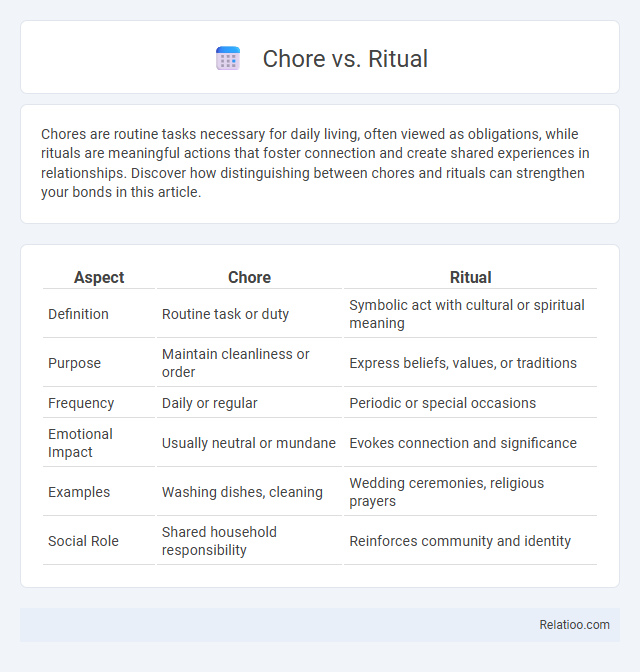Chores are routine tasks necessary for daily living, often viewed as obligations, while rituals are meaningful actions that foster connection and create shared experiences in relationships. Discover how distinguishing between chores and rituals can strengthen your bonds in this article.
Table of Comparison
| Aspect | Chore | Ritual |
|---|---|---|
| Definition | Routine task or duty | Symbolic act with cultural or spiritual meaning |
| Purpose | Maintain cleanliness or order | Express beliefs, values, or traditions |
| Frequency | Daily or regular | Periodic or special occasions |
| Emotional Impact | Usually neutral or mundane | Evokes connection and significance |
| Examples | Washing dishes, cleaning | Wedding ceremonies, religious prayers |
| Social Role | Shared household responsibility | Reinforces community and identity |
Understanding Chores and Rituals
Chores are routine tasks performed regularly to maintain cleanliness and order, such as washing dishes or doing laundry, while rituals involve symbolic actions with emotional or cultural significance, often performed to create meaning or connection. Understanding the difference between chores and rituals highlights how chores primarily address practical needs, whereas rituals fulfill psychological or social functions. Recognizing these distinctions can improve motivation and emotional engagement in daily activities.
Defining Chores: Purpose and Characteristics
Chores are routine tasks typically performed to maintain order and cleanliness in a household, characterized by their repetitive and practical nature. Their primary purpose is to fulfill necessary daily functions, such as cleaning, cooking, or organizing, ensuring a healthy and efficient living environment. Unlike rituals, chores lack symbolic or ceremonial significance and focus on utility rather than meaning or tradition.
What Makes an Activity a Ritual?
An activity becomes a ritual when it carries symbolic meaning, follows a set of repeated, intentional actions, and evokes a sense of purpose or connection beyond its practical function. Unlike chores, which are routine tasks aimed at maintenance or productivity, rituals engage your emotions and reinforce values or beliefs through mindfulness and consistency. You transform a simple action into a ritual by imbuing it with personal significance and observing it regularly with focus and intention.
Key Differences Between Chores and Rituals
Chores are routine tasks typically associated with household maintenance or responsibilities that require consistent effort, while rituals are meaningful, intentional actions often linked to cultural or personal significance. Unlike chores that focus on practicality and completion, rituals emphasize symbolism, mindfulness, and emotional connection, enriching Your daily experience. Understanding these key differences helps identify when an activity serves functional needs versus fostering a deeper sense of purpose or tradition.
Psychological Impact: Chores vs. Rituals
Chores often induce stress and feelings of obligation due to their repetitive and mandatory nature, impacting mental well-being negatively when perceived as burdensome tasks. Rituals enhance psychological health by fostering a sense of meaning, stability, and emotional connection through intentional and symbolic actions. Engaging in rituals can reduce anxiety and promote mindfulness, contrasting with the often mechanical execution of chores that may lack emotional significance.
Everyday Life Examples: Chores and Rituals
Chores in everyday life include tasks like washing dishes, laundry, and vacuuming, which are practical actions performed regularly to maintain cleanliness and order. Rituals, such as morning meditation, family dinners, or bedtime stories, carry symbolic meaning and create a sense of connection and purpose beyond mere functionality. Unlike chores, rituals often foster emotional well-being and reinforce social bonds within households.
Transforming Chores Into Meaningful Rituals
Transforming chores into meaningful rituals enhances daily productivity and emotional well-being by infusing routine tasks with purpose and mindfulness. Rituals involve intentional actions and symbolic meaning, elevating mundane chores such as cleaning, cooking, or organizing into moments of reflection or gratitude. This shift fosters a deeper connection to everyday activities, reducing stress and increasing motivation to maintain a consistent, fulfilling routine.
Cultural Perspectives on Chores and Rituals
Cultural perspectives shape the distinction between chores and rituals, where chores typically represent routine tasks essential for daily functioning, while rituals embody symbolic actions infused with cultural significance. Your cultural background influences how these activities are perceived, with chores often viewed as practical responsibilities and rituals regarded as meaningful ceremonies that reinforce social bonds and traditions. Understanding these differences highlights how routine labor and cultural expression coexist, reflecting values unique to each community.
The Role of Intention: Routine or Ritual?
The role of intention distinguishes a chore from a ritual by transforming routine tasks into meaningful practices through conscious purpose and focus. While chores are often performed out of necessity with minimal engagement, rituals involve deliberate intention, fostering mindfulness and emotional connection. This intentionality elevates the activity beyond mere routine, creating opportunities for reflection, bonding, and enhanced well-being.
Balancing Efficiency and Meaning in Daily Tasks
Balancing efficiency and meaning in daily tasks involves distinguishing between chores, rituals, and routines to optimize productivity and personal fulfillment. Chores are necessary tasks that maintain order and functionality but often lack emotional significance, while rituals imbue daily actions with intentionality and meaning, enhancing well-being and mindfulness. Integrating meaningful rituals into everyday routines transforms mundane chores into purposeful practices, promoting a balanced lifestyle centered on both effectiveness and emotional resonance.

Infographic: Chore vs Ritual
 relatioo.com
relatioo.com